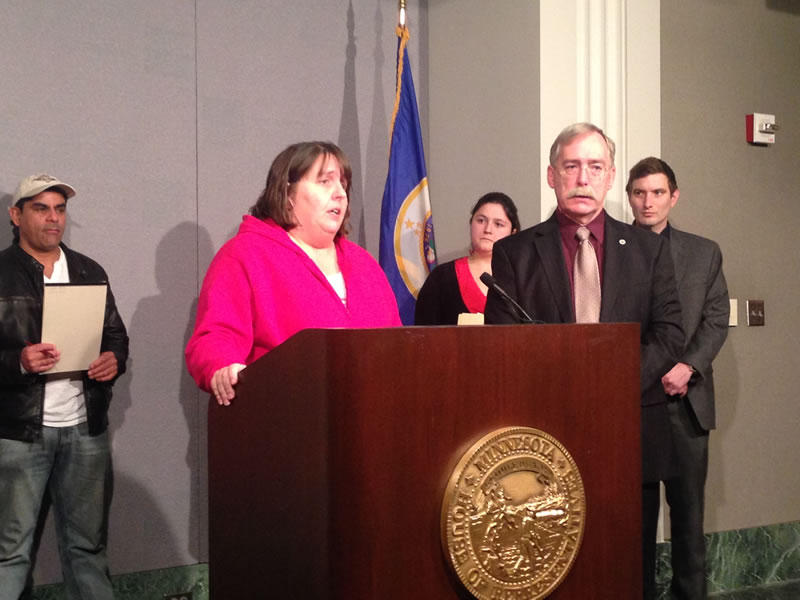

Share
Workers can see their wages stolen in many ways: Not receiving the minimum wage or compensation for overtime. Not receiving their final paycheck after leaving a job. Not being paid at all.
Home care worker Robin Pikala was owed nearly $2,000 when her employer, Crystal Care Home Health Services, shut down last year. Retail cleaner Maria Briones was victimized twice by unscrupulous employers – to the tune of $7,000. Construction worker Gonzalo Monje completed three projects last year for which he was not paid.
“It’s a problem that happens more often than most people think,” said Steve Hunter, secretary-treasurer of the Minnesota AFL-CIO, the labor federation representing some 300,000 workers.
Pikala, Briones and Monje joined Hunter at a news conference Wednesday to back legislation that would crack down on “wage theft” by employers. It would increase penalties for violators and provide outreach to educate workers on their rights.
No specific figures are available for Minnesota, but the Economic Policy Institute estimates that wage theft costs American workers more than $30 billion per year.
To put that into perspective, all of the robberies, burglaries, larcenies, and motor vehicle thefts in the nation cost their victims less than $14 billion in 2012, according to the FBI, Hunter noted.
“There’s a crisis happening and something needs to be done,” said Ruth Schulz, an organizer with CTUL, Centro de Trabajadores Unidos en la Lucha/Center of Workers United in Struggle, a low-wage, worker-led organization based in the Twin Cities.
Over the past seven years, CTUL has partnered with hundreds of workers to recover over $1.6 million in cases of wage theft.
Shulz cited the case of KBS, a large cleaning contractor that often sub-contracts its work to smaller companies.
“In one year, 26 workers at five different KBS sub-contractors approached CTUL in 17 separate incidents with complaints of wage theft, adding up to over $17,000 in unpaid wages,” she said.
Pikala wasn’t the only worker affected when Crystal Care Home Health Services closed. The company owes employees an estimated $1.4 million, she said. “This was an incredible hardship for myself and the dozens of other workers who had to experience this, and no one should have to go through what we went through.”
The legislation, authored by Senator David Tomassoni, DFL-Chisholm, and Representative Carly Melin, DFL-Hibbing, would:
- Increase penalties for wage theft from double to triple the amount owed to the employee.
- Provide criminal penalties for employers who willfully or repeatedly violate this law.
- Ensure wage theft complaints are confidential.
- Extend the statute of limitations on wage theft to six years.
- Allow the state to revoke a business license for non-compliance or multiple abuses in paying back lost wages.
- Require employers who violate this law to post a bond to prove they have the ability to pay wages.
- Provide for grants to community organizations to help educate workers about their rights and how to recoup lost wages.
- Create a wage recovery fund from penalties paid as a contingency to ensure workers receive the wages owed to them.
- Protect workers from employer retaliation.
- Bring Minnesota into conformity with the federal government by extending overtime pay after 40 hours to all employees deemed eligible under federal law.
“The legislation we are proposing sends a clear message to employers who try to cheat their employees out of the wages for which they have worked,” said Melin, who also spoke at the news conference.
Pikala said she hopes the Legislature will pass these reforms. “It may be too late for me, but it should not happen to one more person,” she said.

